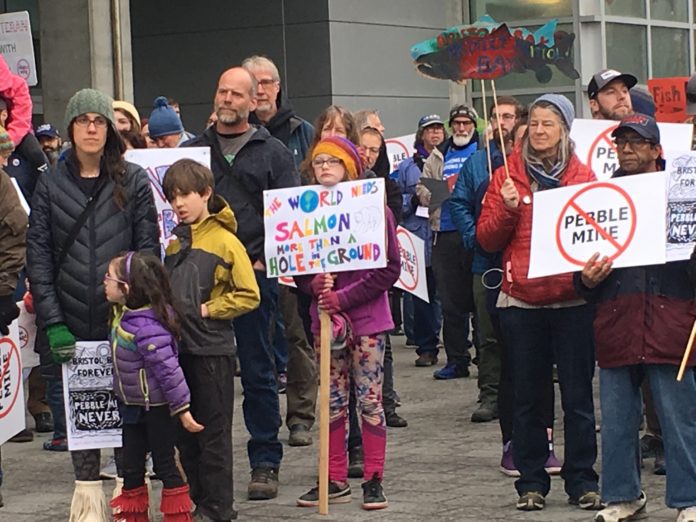
An Environmental Protection Agency decision blocking the proposed Pebble Mine at a site abutting the Bristol Bay watershed could spell an end to the controversial project — or yet another layer of lawsuits in a two decades’ old litigation battle.
On Tuesday, the EPA issued its final Clean Water Act preemptive veto on state-owned land in the Bristol Bay region — which included the proposed Pebble project — determining that disposal of dredged or fill materials from the mine would cause severe damage to fish habitat in the world’s largest run of wild sockeye salmon.
“The Bristol Bay watershed is a vital economic driver, providing jobs, sustenance, and significant ecological and cultural value to the region,” said EPA Administrator Michael Regan. “With this action, EPA is advancing its commitment to help protect this one-of-a-kind ecosystem, safeguard an essential Alaskan industry, and preserve the way of life for more than two dozen Alaska Native villages.”
The total economic value, including subsistence uses of the Bristol Bay watershed’s salmon resources, was estimated at more than $2.2 billion in 2019 and results in 15,000 jobs annually, the EPA noted.
Mine owner Northern Dynasty Minerals in Vancouver, Canada, and Gov. Mike Dunleavy’s administration were quick to blast the EPA’s stance.
“This preemptive action against Pebble is not supported legally, technically, or environmentally,” said John Shively, CEO of the Pebble Limited Partnership, a subsidiary of Northern Dynasty. “As such the next step will likely be to take legal action to fight this injustice.”
Dunleavy criticized what he called “a blanket prohibition on development and usurping the state’s ability and responsibility to protect its own fishery resources. TEPA’s veto sets a dangerous precedent …and our opportunities to show the world a better way to extract our resources should not be unfairly preempted by the federal government.”
Meanwhile, praise for the EPA decision poured in from commercial fishermen and Alaska Native entities in the Bristol Bay region and conservation groups nationwide, from Cook Inletkeeper in Homer, Alaska, to Trout Unlimited.
“The work in Bristol Bay isn’t done but today is a milestone to be celebrated,” said Nelli Williams, Alaska director for Trout Unlimited.
“This sends yet another very strong message to the Pebble Partnership: your mine is not wanted here; we have better plans for Bristol Bay,” said Brian Kraft, another spokesman for Trout Unlimited who operates two fishing lodges in Bristol Bay.
Katherine Carscallen, director of commercial fishermen for Bristol Bay, said this season will look different for the people who fish in the bay.
“For the first time in two decades, our fishermen will head out on the water this fishing season without the existential threat of Pebble Mine looming just up-river,” she said.
According to Carscallen, Clean Water Act protections were first requested 13 years ago and commercial fishermen have worked to seek permanent and durable preservation for the habitat that sustains Bristol Bay’s record-breaking fishery. These protections will ensure that Bristol Bay and the 15,000 jobs, $2.2 billion in economic activity, and the generational fishery it supports, can continue to thrive for years to come, she said.
Alannah Hurley, executive director of United Tribes of Bristol Bay, said the EPA’s decision this week transcends generations of activists.
“Many of those who began this battle are no longer with us,” Hurley said during a news conference in Dillingham. “New generations of our people have been born and raised with the cloud of Pebble hanging overhead … But our ancestral responsibility to safeguard our watershed and fishery has united all of us in our work to defend the world’s last great wild salmon fishery.”
Alaska’s congressional delegation was somewhat divided on the issue.
Sen. Dan Sullivan, R-Alaska, criticized the move, stating that “using a preemptive veto raises serious legal questions and has the potential to establish a very troubling precedent for resource development on state of Alaska lands.”
But Sen. Lisa Murkowski, R-Alaska, and Rep. Mary Peltola, D-Alaska, praised the EPA’s stance.
“As Senator (Ted) Stevens once said, it is ‘the wrong mine in the wrong place’ and does not deserve to move forward- for good reason,” Murkowski said.
Peltola, who is from Bethel — a city north of Dillingham also in Western Alaska — said fisheries issues like these inspired her congressional bid in the first place.
“Rebuilding our salmon runs and protecting our fish was the number one reason I decided to run for Congress,” she said. “Today the EPA listened to Alaskans and helped us do just that.”





